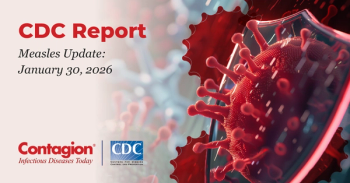
FDA VRBPAC Votes to Recommend Moderna COVID-19 Vaccine in Children and Adolescents 6 Years Through 17 Years
The committee voted twice splitting the questions into younger children (6-11 years) and adolescent (12-17 years) cohorts due to different vaccine dosing amounts.
The Food and Drug Administration's (FDA) Vaccines and Related Biological Products Advisory Committee (VRBPAC) panel voted to recommend amending the Emergency Use Authorization (EUA) of the Moderna COVID-19 mRNA vaccine, mRNA-1273, (Spikevax) to include the administration of the primary series to children and adolescents 6 years through 17 years of age.
They split the vote to address younger children and then adolescents due to the different dosage in the vaccines. For the 6-11 year old group, they are using 50mcg for each dose, and for the 12-17 year old group, they are using 100mcg for each dose.
The committee voted on the following 2 questions:
- Based on the totality of scientific evidence available, do the benefits of the Moderna COVID-19 Vaccine when administered as a 2-dose series (100mcg each dose) outweigh its risks for use in adolescents 12 through 17 years of age?
- Based on the totality of scientific evidence available, do the benefits of the Moderna COVID-19 Vaccine when administered as a 2-dose series (50mcg each dose) outweigh its risks for use in adolescents 6 through 11 years of age?
For the first question (12 through 17 years of age), the vote was a unanimous 22-0 in favor of amending the EUA.
For the second question (6 through 11 years of age), the vote was a unanimous 22-0 in favor of amending the EUA.
The Data
Last year, Moderna
The vaccine efficacy in the nearly 2500 adolescents who received the mRNA-1273 vaccine was observed to be 100% when using the same case definition as in the phase 3 COVE study in adults. In addition, a vaccine efficacy of 93% in seronegative participants was observed starting 14 days after the first dose using the secondary Centers for Disease Control and Prevention (CDC) case definition of COVID-19, which tested for milder disease.
The mRNA-1273 vaccine was generally well tolerated with a safety and tolerability profile generally consistent with the
During today’s meeting, representatives from Moderna discussed Study 203 (12-17 years) and Study 204 (6-11 years).
Study 203. Participants receiving at least 1 injection were administered was 100 mcg delivered to 2486 participants in the one cohort and 1240 participants in the placebo group. There was a 93.3%- 100% vaccine efficacy against COVID-19 infection.
Study 204. They broke the study into two parts. Moderna broke out a dose-ranging arm using 50mcg and 100mcg and then a blinded, randomized arm using 50mcg. There was a 88% - 92% vaccine efficacy against COVID-19 infection.
Participants receiving at least 1 injection were administered with a dose using 50 mcg, and was delivered to 3387 participants with 995 participants in the placebo group.
Myocarditis
As with the most recent previous FDA VRBPAC meeting, a large discussion revolved around myocarditis risks. Speakers went through various slides, and a few things to point out:
- Some evidence suggests the Moderna vaccine may have a higher risk of myocarditis than the Pfizer-BioNTech vaccine; however CDC said the findings were not consistent in all US monitoring systems.
- CDC verified 635 cases of myocarditis in children ages 5-17 years after 54.8 million Pfizer-BioNTech doses were administered in this age group in the US.
- The risk appears to be greatest in the 16-17 years and 12-15 years age groups.
- The largest number of cases happened after the second dose.
- More cases appeared in males compared to females.
The Proceedings
The significance of this meeting is that currently there is only 1 COVID-19 vaccine, the Pfizer-BioNTech vaccine, that is available in this patient population (5-17 years old).
One of the CDC presenters made the point that the biggest impact of vaccines happens during the surges.
During a morning question and answer, one of the committee members said the data showed vaccines are only protecting people for 3-6 months, so what is the CDC messaging for that?
The response was yes, shorter protection from infection but people are still protected against severe COVID-19 and hospitalization.
Next Steps
The next step in the process after today's votes is for both the FDA and CDC to weigh in on this recommendation.
In addition, the FDA VRBPAC will be meeting tomorrow (Wednesday, June 15) to address amending the EUA of the Moderna COVID-19 mRNA vaccine to include the administration of the primary series to infants and children 6 months through 5 years of age, and also discuss amending the EUA of the Pfizer-BioNTech COVID-19 mRNA vaccine to include the administration of the primary series to infants and children 6 months through 4 years of age.
Check back with Contagion in the latter part of Wednesday afternoon to learn more about the vote.
Newsletter
Stay ahead of emerging infectious disease threats with expert insights and breaking research. Subscribe now to get updates delivered straight to your inbox.

































































































































